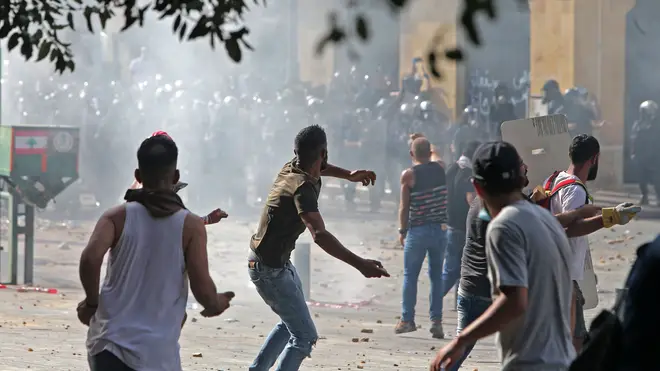
Simon Marks 3pm - 7pm
8 August 2020, 16:17

Beirut police fired tear gas as they clashed with protesters demonstrating over this week's massive explosion that killed more than 150 people.
Thousands of people poured into Beirut's main square, where they set up symbolic nooses to hang politicians whose corruption and negligence they blame for Tuesday's explosion at the Port of Beirut.
The huge blast was caused by thousands of tons of ammonium nitrate improperly stored at the port for more than six years, apparently set off by a fire.
It was the biggest in Lebanon's history and caused an estimated £7.6 billion-£11.5 billion worth of damage, according to Beirut's governor. It also left hundreds of thousands of people homeless.
The protest Saturday was the first significant demonstration since the explosion and organisers planned to hold a symbolic funeral for the dead.
As the protest got underway however, small groups of young men began throwing stones at security forces.

Huge explosion in Lebanese capital Beirut
Near parliament, riot police fired tear gas at protesters who hurled stones and tried to jump over barriers that closed the road leading to the parliament buildings.
Protesters later set fire to a lorry that was fortifying barriers on a road leading to parliament.
The gathering at Martyrs Square and outside the parliament building and government headquarters came amid popular anger against Lebanon's political leadership.
Beirut's ruling class, made up mostly of former civil war-era leaders, is blamed for widespread corruption, incompetence and mismanagement that contributed to Tuesday's explosion.
The army issued a statement reminding the protesters to act peacefully and abstain from closing roads or attacking public or private property.
Police also issued a statement after the protests began urging people to act "in a civilised way far away from violence".
The protest came as senior officials from the Middle East and Europe arrived in Lebanon in a show of solidarity with the tiny country that is still in shock suffered after the blast.

Dominic Raab says UK will send emergency support to Lebanon after Beirut explosion
Lebanon is mired in its worst economic and financial crisis in decades making it difficult for many people who had their properties damaged to fix them.
In a show of anger, the president of the Christian opposition Kataeb party said its three legislators have decided to resign from parliament over this week's "disaster."
Sami Gemayel called on every "honourable" member of parliament to resign and work for the "birth of a new Lebanon".
A senior Kataeb party official was killed in the blast, which claimed at least 154 lives, wounded more than 5,000 people and laid waste to the country's largest port and nearby areas.
Also killed were 43 Syrians, the country's embassy in Beirut said. Lebanon is home to some one million Syrian refugees.
The Dutch foreign ministry said Saturday that Hedwig Waltmans-Molier, the wife of the Netherlands' ambassador to Lebanon, had also died of injuries sustained in the blast.
Documents that surfaced after the blast showed that for years officials had been repeatedly warned that the presence of 2,750 tons of ammonium nitrate at the port posed a grave danger, but no one acted to remove it.
Officials have been blaming one another since the explosion and 19 people have been detained including the port's chief, head of Lebanon's customs department and his predecessor.
"We will support Lebanon through all available means," Ahmed Aboul Gheit, the secretary-general of the 22-member Arab League told reporters after meeting President Michel Aoun on Saturday.
Mr Aboul Gheit said he would take part in a donors conference for Lebanon in France on Sunday and convey Lebanon's demands to the international community.
Later on Saturday the president of the European Council, Charles Michel, arrived in Beirut for a brief visit.
Turkey's vice president and the country's foreign minister arrived Saturday and met Mr Aoun, saying that Ankara was ready to help rebuild Beirut's port and evacuate some of the wounded from Lebanon to Turkey for treatment.
At the site of the blast in Beirut's port, workers were still searching for dozens of missing people. Bulldozers were also seen removing debris near the giant grain silos that are still partly standing.
International aid has been flowing to Lebanon for days and several field hospitals have been set up around Beirut to help treat the wounded.
The ammonium nitrate, a chemical used in fertilisers and explosives, originated from a cargo ship called MV Rhosus that had been travelling from Georgia to Mozambique in 2013.
It made an unscheduled detour to Beirut as the Russian shipowner was struggling with debts and hoped to earn some extra cash in Lebanon. Unable to pay port fees and reportedly leaking, the ship was impounded.
In 2014, the material was moved from the ship and placed in a warehouse at the port where it stayed until the explosion.